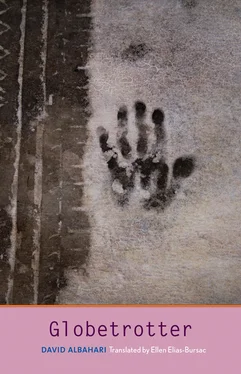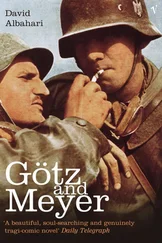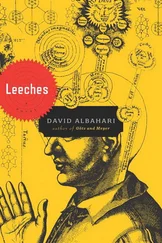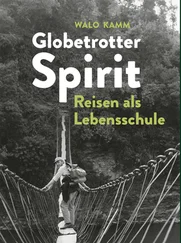Sometimes the three of us spoke at once, just as we all stopped talking at once a few times. Then I felt an almost-tangible discomfort, for I was convinced that I could see forming between Daniel Atijas and Ivan Matulić’s grandson a subtle thread of rapport, something which had never begun, let alone formed, between Daniel Atijas and me. Then we were quite drunk and none of us could say with certainty how many beers we had had. Daniel Atijas claimed we’d downed eight bottles, meaning eight each, of course, but then he shrugged that off, saying that this meant nothing, because numbers were mere conventions; every person, he said, can define numbers for themselves, and he, for instance, he said, might speak of eight empties, all the while having, for instance, sixteen or twelve in mind, or not even one, which would be particularly strange, because zero is not actually a number, since it signifies nothing, and nothing, as everyone knows, he said, cannot be counted. Perhaps things would have been different, said Ivan Matulić’s grandson, had we been drinking from steins, though then, he realized, it would have been harder to keep track, since steins, he said, hold more beer than fits in a bottle yet less than fits in two. This shows, said Daniel Atijas, that the differences in the systems of education don’t count, because even though there can be no doubt that the European system is more rigorous than the North American system, he said, none of us is able to do arithmetic properly, so it’s best, he said, for us to order another round, which will, he was convinced, refresh us and perhaps spur us on in such serious endeavors of thought. The noise at The Sailor’s Pub had become really unbearable by then, and for us to hear one another we had to shout into one another’s ears, which I had never liked, especially when Daniel Atijas’s lips touched the whorls of Ivan Matulić’s grandson’s ear.
He was shouting into my ear from a greater distance, I was sure of it. So I was the first to say that it was time for us to go, not meaning that we should go off somewhere together but that we each go our separate way, though it wasn’t late and the night, as we saw when we went outside, wasn’t quite dense enough yet; the darkness was more a dark blue than a black. Only when we were out in front of the restaurant, when the freshness of the night made us feel first more sober and then more drunk than we actually were, Daniel Atijas suggested that we all go to his place, to his room at Lloyd Hall, for he had something there, he said, which would make us happy, and happiness, he said, is not something to dismiss out of hand, with which Ivan Matulić’s grandson and I agreed. All three of us were swaying, though there wasn’t even the lightest breeze, and when we finally made it down Beaver Street to Buffalo and went into the back alley that was paved in gravel, every little stone, even the smallest, was a nearly insurmountable obstacle. Like mountain climbers, we negotiated the steep path that led by the cemetery, one by one, with pushing and shoving, occasional curses, and assertions that the time had finally come for us to seek a place for our eternal rest, for every honest person, said Daniel Atijas, has already lain a long time in his grave, while we, he said, like these phantoms, are flailing about on mountain peaks. When we reached the top of the path, we caught sight of the three little mounds in the dark, and just in case, convinced that they were slumbering elks, we made a large detour around them, which took us to the entrance of Lloyd Hall.
While we were going up to the third floor in the elevator I felt as if I were in a boat. Everything rocked and lurched so much that I said so out loud, and Ivan Matulić’s grandson replied that perhaps this was Noah’s ark, a comment to which Daniel Atijas added that mankind would not have much to hope for if the three of us were the last to survive on earth. Furthermore, he said, Noah’s ark had moved along a horizontal axis, while we, he said, were moving vertically; and while Noah’s ark conquered space and time, both were inaccessible to us, he said, because in essence, we were standing in place. Neither Ivan Matulić’s grandson nor I had anything to say to that, the grandson because he had dozed off, his face pressed into the corner of the elevator, and I because I was thinking that if I were to open my mouth even a little, I would throw up. I relaxed only when the elevator stopped, the door opened, and we stepped out onto the carpeted floor, though I was still pressing my lips tightly together. Daniel Atijas groped for his room key in his left pocket, then remembered to look in his right, where the key actually was. Ivan Matulić’s grandson was the first to go into the bathroom, Daniel Atijas went after him, and I after him. Two or three droplets of urine glistened on the floor in front of the toilet bowl, a crumpled sheet of toilet paper floated on the water, a soft hum came from the pipes, and the toilet was groaning like a human being when I pressed the little lever that protruded from the side. When I went back into the room, Daniel Atijas opened his suitcase and produced the bottle of whiskey.
It took us a while to find two glasses and a plastic cup, and then time, too, began to disintegrate, and later, the next morning, I wasn’t always able to find the right sounds for the images that had been cropping up before my eyes. I would see, for instance, Ivan Matulić’s grandson sobbing, or his face convulsing into an awful grimace, but his words didn’t reach me, and instead my voice would be monotonously listing the exemplars of prairie flora and fauna, though I don’t remember that we had been talking about that at all; or I would see Daniel Atijas, say, shake his head and speak with incredulity while all I could hear was Ivan Matulić’s grandson’s drunken song, and that in an unfamiliar language. There were, however, also whole fragments, as well as those that, though whole, went on in silence. The only thing lacking was sound fragments in darkness, though that part of the night plunged regularly into darkness and then swam out of it again. Just as the body has no memory of pain, said Daniel Atijas when I mentioned this to him later, so the mind has no memory of darkness. I am not sure that’s so, but I didn’t want to argue, though I did not fail to tell him that I remember certain moments in prairie darkness and that each of them, each of these darknesses, was distinct. Daniel Atijas was adamant. He shot back that those are later memories and that I, as a painter, strove to discover the nuances in something that in fact had no color at all. Now that I think about it, he had struck me from the very start as the type who can be stubborn, though I had not expected him to be so stubborn, which only shows that a person must be considerate of everything, including himself — even more so himself, perhaps, than others, since it is always easier to betray oneself than others.
I said something like that, I remember, in the middle of the night, just when Ivan Matulić’s grandson was throwing up in the bathroom. Before that, a while before that, he was kneeling in front of Daniel Atijas, hugging his knees and trying to peel off his socks, with the intention, he said, of kissing his feet. As Daniel Atijas was pushing him away, an entirely sober look flashed for just a moment in his eyes, but then it faded, and no matter how hard I later tried, I couldn’t find it again. Ivan Matulić’s grandson, and I can say this now, looked totally undignified, spittle dribbling down his chin, his forehead covered in beads of sweat, hiccupping and burping and doing nothing to hide it. He mentioned a secret, something about how he had a secret, how he had stumbled upon the secret, but ever since that moment his life had not been what it was before. He was not able, when I asked him, to say what his life had been before, but he was certain that he would never be able to go back to his earlier self, whatever that meant. There you are, he said, walking along one side of the street, and then, after years and years, he said, you cross over, and nothing is ever the same again. Something like that, he said, had happened with his life, too. He crossed over to the other side, and nothing was the same. He could see things he hadn’t noticed before, but he wasn’t sure he wanted to. Then he went to the bathroom to throw up, and Daniel Atijas asked me whether I played chess. I told him I would have to think about that for a while because I couldn’t remember, but by the time I finally recalled some moves and even saw the beginning of the Sicilian defense quite clearly, I heard him snoring.
Читать дальше







![David Jagusson - Fesselspiele mit Meister David [Hardcore BDSM]](/books/486693/david-jagusson-fesselspiele-mit-meister-david-har-thumb.webp)




